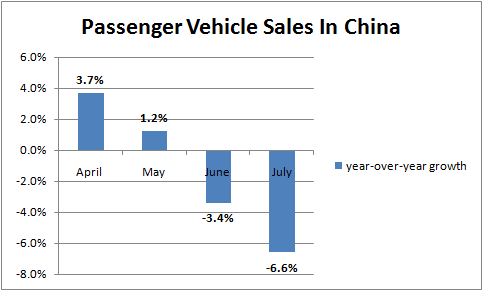The Future Of Premium Automakers In China: Lessons From BMW And Porsche

Table of Contents
BMW's China Strategy: Localization and Electrification
BMW's remarkable success in China is a testament to its shrewd understanding of the local market. Their strategy hinges on two key pillars: deep localization and a robust push towards electrification.
Localization Efforts: A Deep Dive into the Chinese Market
BMW's commitment to localization goes far beyond simple translation. It's a multifaceted strategy designed to resonate deeply with Chinese consumers.
- Significant Investment in Local Production: BMW has invested heavily in manufacturing facilities within China, minimizing import costs and ensuring efficient distribution.
- Tailoring to Preferences: The company meticulously tailors its models to suit the preferences of Chinese drivers. This includes offering longer wheelbases for increased rear-seat space, a highly valued feature in the Chinese market, and providing a wider array of color options to cater to diverse tastes.
- Strategic Partnerships: BMW actively cultivates partnerships with Chinese suppliers and technology companies, leveraging local expertise and building stronger relationships within the industry.
- Robust Dealer Network: A strong and well-established network of dealerships and service centers across China is crucial for providing excellent customer service and maintaining brand reputation.
Electrification Push: Charging into the Future
BMW recognizes the burgeoning demand for electric vehicles (EVs) in China and has made significant investments to capitalize on this trend.
- EV Manufacturing and Infrastructure: Substantial investment in EV manufacturing and charging infrastructure is underway, ensuring the availability of charging stations and addressing range anxiety, a major concern for potential EV buyers.
- China-Specific EV Models: BMW is introducing new EV models specifically designed for the Chinese market, understanding the unique needs and preferences of this consumer base.
- Government Incentives: BMW is actively leveraging government incentives and subsidies for EVs to further enhance its market competitiveness and affordability.
Porsche's Focus: Exclusivity and Digital Engagement
While BMW emphasizes localization, Porsche's strategy in China centers on maintaining its exclusive brand image and embracing digital channels to connect with discerning customers.
Maintaining Brand Exclusivity: The Art of the Premium
Porsche's approach prioritizes preserving its prestigious brand identity in a rapidly expanding market.
- Strategic Pricing and Limited Production: Porsche strategically manages pricing and production runs for select models, ensuring that its vehicles remain desirable and exclusive.
- Personalized Customer Experiences: The brand invests heavily in personalized customer experiences and bespoke services, creating a sense of exclusivity and individual attention.
- Cultivating a Brand Community: Porsche cultivates a strong brand community through exclusive events, providing owners with unique experiences and fostering loyalty.
- Upholding Brand Standards: Porsche’s dealer network is carefully managed to uphold the brand's high standards of service and customer experience.
Leveraging Digital Channels: Connecting with a Connected Generation
Porsche successfully uses digital channels to engage with the tech-savvy Chinese consumer.
- Targeted Digital Marketing: Porsche employs sophisticated digital marketing campaigns, targeting specific demographics and interests through various online platforms.
- Social Media Engagement: Active engagement on popular Chinese social media platforms helps build brand awareness and fosters direct interaction with potential customers.
- Online Sales and After-Sales: Investment in online sales and after-sales service channels facilitates convenient and seamless customer interactions.
- Data-Driven Insights: Porsche utilizes data analytics to deeply understand consumer preferences and tailor its marketing and product strategies accordingly.
Challenges Facing Premium Automakers in China
Despite their successes, premium automakers face considerable challenges in the Chinese market.
Intense Competition: A Crowded Playing Field
The premium segment in China is fiercely competitive, with the rise of strong domestic brands and the continued presence of other established international players.
- Price, Features, and Technology: Competition is intense across price, features, and technological innovation. Automakers must continuously innovate and differentiate their offerings to remain competitive.
- Regulatory Landscape: Navigating the complexities of the Chinese regulatory environment requires careful planning and adherence to constantly evolving regulations.
Shifting Consumer Preferences: A Moving Target
Chinese luxury car buyers' preferences are constantly evolving, demanding adaptation and innovation.
- Electric and Hybrid Vehicles: The growing preference for electric and hybrid vehicles necessitates significant investments in EV technology and infrastructure.
- Technological Advancements: Chinese consumers place a high value on advanced technologies, including autonomous driving features and connected car functionalities.
- Sustainability and Environmental Concerns: Growing awareness of environmental issues is influencing purchasing decisions, demanding sustainable practices and eco-friendly technologies.
- Personalized Customer Experience: Providing personalized and unique customer experiences is becoming increasingly important in attracting and retaining customers.
Opportunities for Future Growth: A Look Ahead
Despite the challenges, significant opportunities exist for premium automakers in China.
The Expanding Middle Class: A Growing Market
The rapid expansion of China's middle class presents a significant opportunity for growth in the premium car segment. This burgeoning consumer base has increased purchasing power and a strong desire for luxury goods and vehicles.
Government Support for New Energy Vehicles: A Boost for EVs
The Chinese government's strong support for new energy vehicles (NEVs) through subsidies and favorable policies creates a favorable environment for EV manufacturers.
Technological Advancements: The Innovation Frontier
Opportunities abound for innovation and leadership in cutting-edge technologies, such as autonomous driving, connected car technologies, and advanced driver-assistance systems (ADAS).
Conclusion: Navigating the Future of Premium Automakers in China
The future of premium automakers in China depends on their ability to adapt to the dynamic market conditions. BMW and Porsche's strategies, showcasing localization, digital engagement, and brand preservation, offer valuable lessons. However, intense competition and evolving consumer preferences demand continuous innovation and a customer-centric approach. By embracing technological advancements, focusing on delivering exceptional customer experiences, and understanding the nuances of the Chinese market, premium automakers can not only survive but thrive in this lucrative and increasingly complex landscape. To stay ahead in this competitive market, a deep understanding of the strategies employed by successful premium automakers in China is crucial. Learn more about the evolving dynamics of premium automakers in China and how they are shaping the future of the automotive industry.

Featured Posts
-
 Review Of Dr Terrors House Of Horrors Is It Worth The Visit
May 26, 2025
Review Of Dr Terrors House Of Horrors Is It Worth The Visit
May 26, 2025 -
 How To Make Housing Affordable Without Crashing Home Prices Insights From Gregor Robertson
May 26, 2025
How To Make Housing Affordable Without Crashing Home Prices Insights From Gregor Robertson
May 26, 2025 -
 Michael Schumacher And His Rivals A Look At His Controversial Career
May 26, 2025
Michael Schumacher And His Rivals A Look At His Controversial Career
May 26, 2025 -
 Freed Hostages Agam Berger And Daniel Weiss To Participate In March Of The Living
May 26, 2025
Freed Hostages Agam Berger And Daniel Weiss To Participate In March Of The Living
May 26, 2025 -
 Live Streaming Moto Gp Argentina 2025 Nonton Balap Dini Hari
May 26, 2025
Live Streaming Moto Gp Argentina 2025 Nonton Balap Dini Hari
May 26, 2025
